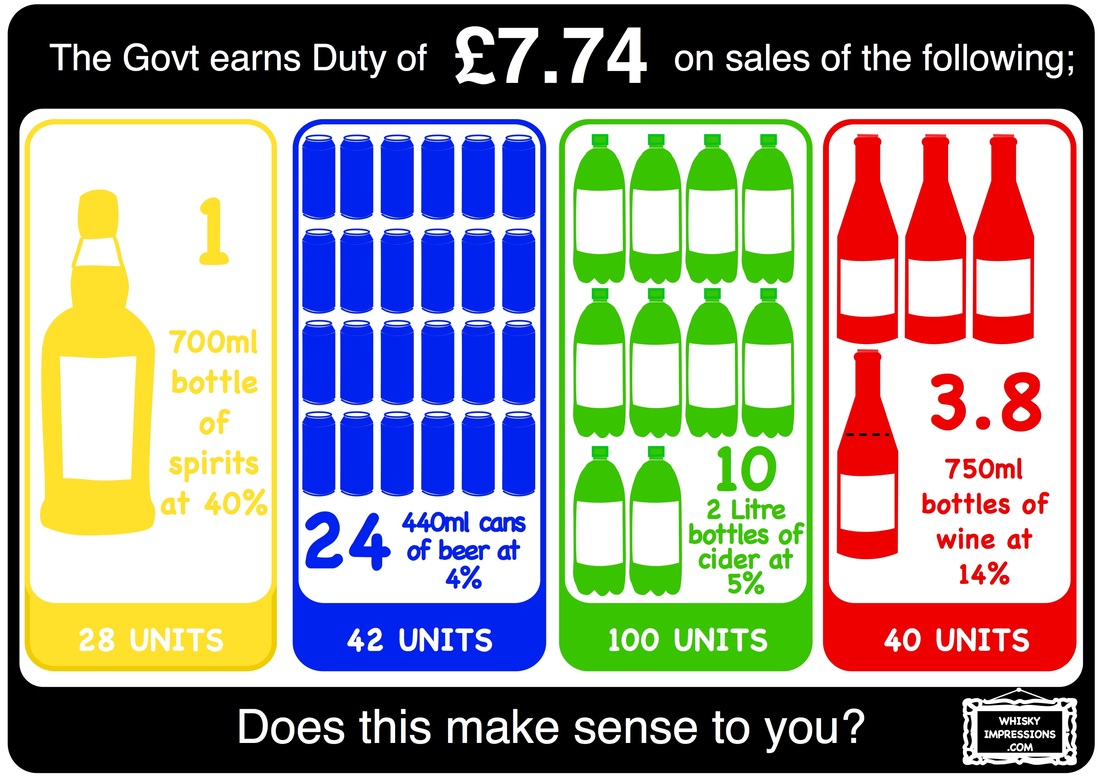The Great Duty Debate Part 2 - or 'How much difference is that 2% cut really going to make?'28/3/2015 So, the big news this month is that the Chancellor has cut Duty on spirits by a whopping 2%. Well whoop de doo. Don’t get me wrong, this is definitely a step in the right direction but how much difference is it really going to make? Assuming that this Duty cut actually gets passed on to the end consumer (which I very much doubt), that equates to a saving of a grand total of 20 pence, including VAT, on every bottle of spirits you buy. For sake of argument, let’s say you buy a bottle of whisky a week. In just over a year, 58 weeks to be precise, you’ll have saved enough money to buy yourself a bottle of Tesco Value blended whisky. Won’t that be a treat? Seriously though, if saving 20p on a bottle of spirits really makes a difference to your life then you really shouldn't be buying it in the first place! It wasn't just spirit duty that was cut either, beer duty was also cut by a penny a pint. So if you buy 300 pints, you effectively get one free. I don’t really know how much a pint costs these days, it may not be £3, but you get the idea. But maybe I’m looking at this the wrong way. Maybe it’s more about the wider political and economic implications rather than how it affects the end consumer - a tacit agreement by the government that alcohol duty is, in fact, too high? Or a cynical plot to win over voters with a crowd pleasing tax cut in a General Election year? I know which one I’m going for! The SWA is certainly hailing it as a historic move though and a ‘significant boost to a home-grown industry’. When you consider that there have only ever been five spirits duty cuts since the landmark 1823 Excise Act then this duty cut, small as it is, certainly does seem to take on a bit more importance. It’s when you look at alcohol duty overall though, and not just spirits duty, that you realise just how highly taxed spirits are compared to other alcoholic drinks. I hadn't realised quite how much of a difference there was until I looked it up on the HMRC website. And it’s not just the levels of duty that are different either, it’s also the way the duty is calculated. For example; spirits and beer are taxed according to alcohol strength (litres of pure alcohol) whereas cider and wine are both taxed by volume of product (albeit with lower or higher duty rates for very low or very high alcohol examples of these). The end result is wildly different duty receipts depending on what you are buying. I’ve done another infographic (starting to like these things) to show just how much disparity there is! For those of you that like concrete figures, the Duty per litre on the examples I have used is;
Spirits at 40%vol £11.06 Beer at 4% vol £0.73 Cider at 5% vol £0.39 Wine at 14% vol £2.73 For the purposes of comparison, if everything was taxed the same as spirits, the figures would be; Spirits at 40%vol £11.06 Beer at 4% vol £1.10 Cider at 5% vol £1.38 Wine at 14% vol £3.87 Bit of a difference, isn't it? I think it’s time for a radical overhaul of the duty system. I tend to agree with the SWA that the fairest way of doing things is to have one duty rate based on the litres of pure alcohol in the product. After all, alcohol is alcohol, right? Especially in these days of responsible drinking and recommended units. Why should one unit of alcohol consumed as whisky be treated any differently from one of beer or cider or wine? You could always have reduced duty rates for small scale producers (as they already do for beer) to help small or new producers, who don’t have the same economies of scale for their raw materials or production costs, compete on a more level playing field than the big boys. Surely this would do more to stimulate the economy and support home grown industry than a token 2% duty cut, welcome as it is?
0 Comments
Leave a Reply. |
AuthorWhisky Impressions is run by Kate Watt. Previously at Springbank and then Glenfarclas, I now design some whisky related stuff and write about it, and anything else that takes my fancy, on this blog. Archives
January 2019
Categories
All
|

 RSS Feed
RSS Feed
